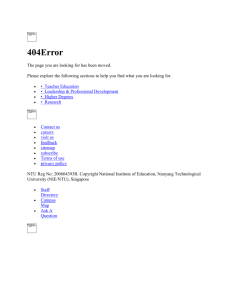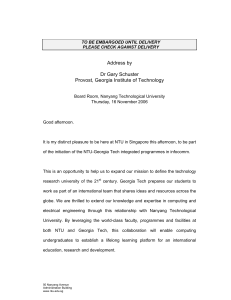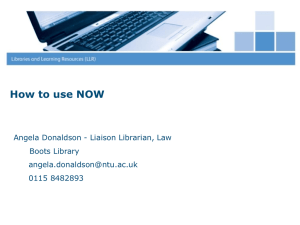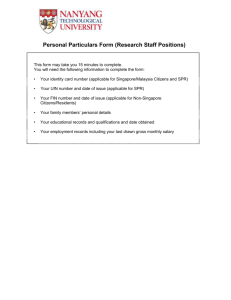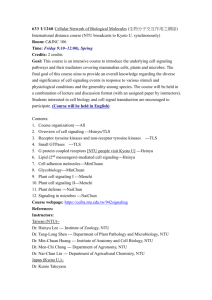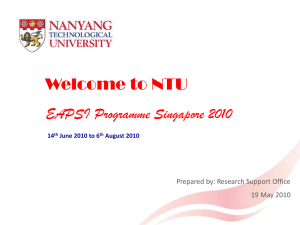GUIDELINES FOR WRITING THE STUDENT REPORT
advertisement
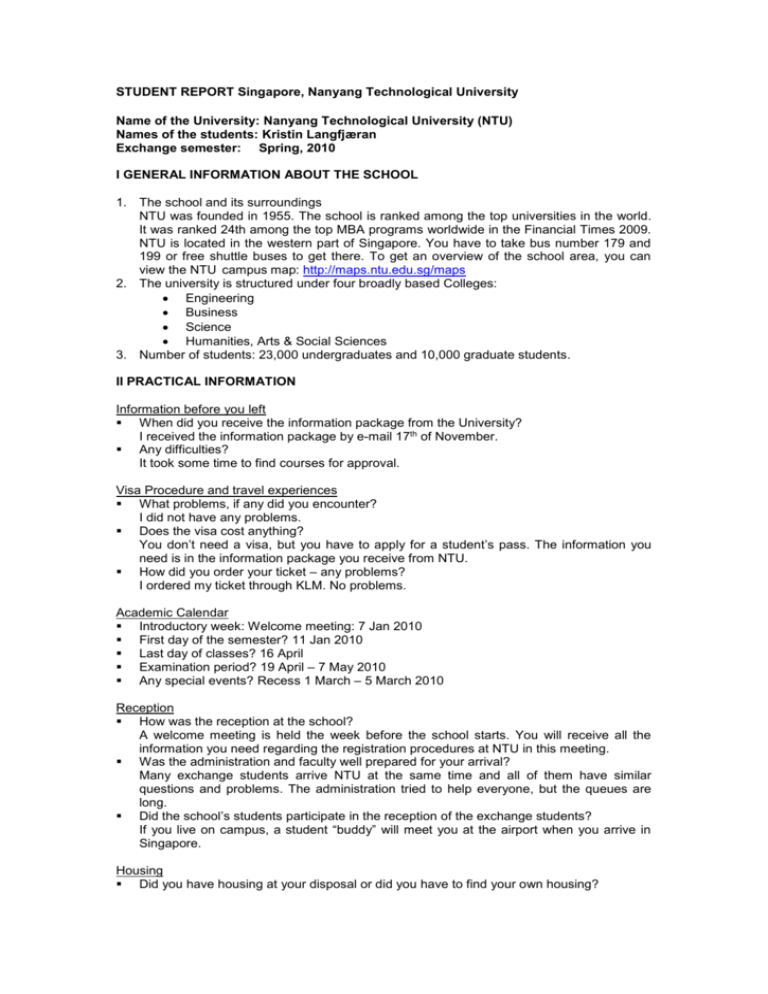
STUDENT REPORT Singapore, Nanyang Technological University Name of the University: Nanyang Technological University (NTU) Names of the students: Kristin Langfjæran Exchange semester: Spring, 2010 I GENERAL INFORMATION ABOUT THE SCHOOL 1. The school and its surroundings NTU was founded in 1955. The school is ranked among the top universities in the world. It was ranked 24th among the top MBA programs worldwide in the Financial Times 2009. NTU is located in the western part of Singapore. You have to take bus number 179 and 199 or free shuttle buses to get there. To get an overview of the school area, you can view the NTU campus map: http://maps.ntu.edu.sg/maps 2. The university is structured under four broadly based Colleges: Engineering Business Science Humanities, Arts & Social Sciences 3. Number of students: 23,000 undergraduates and 10,000 graduate students. II PRACTICAL INFORMATION Information before you left When did you receive the information package from the University? I received the information package by e-mail 17th of November. Any difficulties? It took some time to find courses for approval. Visa Procedure and travel experiences What problems, if any did you encounter? I did not have any problems. Does the visa cost anything? You don’t need a visa, but you have to apply for a student’s pass. The information you need is in the information package you receive from NTU. How did you order your ticket – any problems? I ordered my ticket through KLM. No problems. Academic Calendar Introductory week: Welcome meeting: 7 Jan 2010 First day of the semester? 11 Jan 2010 Last day of classes? 16 April Examination period? 19 April – 7 May 2010 Any special events? Recess 1 March – 5 March 2010 Reception How was the reception at the school? A welcome meeting is held the week before the school starts. You will receive all the information you need regarding the registration procedures at NTU in this meeting. Was the administration and faculty well prepared for your arrival? Many exchange students arrive NTU at the same time and all of them have similar questions and problems. The administration tried to help everyone, but the queues are long. Did the school’s students participate in the reception of the exchange students? If you live on campus, a student “buddy” will meet you at the airport when you arrive in Singapore. Housing Did you have housing at your disposal or did you have to find your own housing? I was offered housing on campus, bud I chose to live off campus. I moved in with three Norwegian students from the International Marketing program at BI. What support did you receive from the school in locating housing? The international student centre at BI helped me get in contact with the BI International Marketing students in Singapore. Costs Describe the most important expenses such as rent, books, food, etc. The rent is approximately the same in Singapore as in Norway. It’s about 3500 NOK plus electricity and water costs. Books are half the prize. Food, public transportation (MRT and buses) and taxi are cheaper. The International Office Is there an international office? Yes. There is a Student Services Centre and an International House located on campus (Nanyang Avenue). Who is responsible for incoming exchange students? Student Services Centre. If you have any questions, go to the Student Services Centre. How does the international office function? You have to meet up and talk to them. They will give you information and help you. Do you receive all relevant information? Yes, in the information package you receive by mail. Exchange promotion What kind of activity did you take part in to promote exchange to Norway at your exchange university? There were no activities arranged by NTU. Social Activities How is your relationship with other students? I was the only exchange student in my classes, so I got to know many Singaporeans. The local students were curios to get to know me and learn more about Europe and Norway. How is the relationship among the exchange students? Good. Are there any special activities and gatherings for exchange students? If you would like to be updated on everything that happens, there are different facebook groups that you can attend. For example: “NTU Exchange Students 2010 Autumn Group”. Culture and Language Do you have any language problems with the faculty or other students? No. How are the possibilities to experience the country and the culture? Good. Singapore is a small country and easy to get around in. If you are open and friendly you will make good friends with the Singaporeans. Cultural and Social Effects from the Exchange Experience How do you think the exchange experience will affect you from a cultural and social point of view? I did not know anyone before I arrived in Singapore, but it was easy to make new friends, both local students and other exchange students. The exchange experience has taught me to be more open to other cultures. How do you think the exchange experience influences your future career possibilities? I think it will help my future career. Many employers value an exchange experience. III ACADEMIC INFORMATION The Teaching situation In which language are the courses taught? Any problems? English. It takes some time getting used to the “Singlish”. It can be difficult to understand some of the teachers and students. How would you evaluate the level of study in relationship to the level at BI? About the same. Are the professors using cases, group work or lectures (or a mix)? It depends on what subjects you have. If you attend subjects with only lectures it is about the same as at BI. If you attend subjects with seminars, there are projects, write-ups and presentations throughout the semester. You will also be judged on in class participation. If you attend the seminars, it is easier to get to know the locals. How is the workload compared to that at BI? I only attended seminars. The workload was heavier than at BI, due to the many write-ups and presentations. How is the relationship between faculty and students? If you attend seminars you will get to know the teachers very well because there are only 25-30 students in each class. What is the relationship between the students in the classroom? In seminars, you will be given a group in the beginning of the semester. You will sit with this group in all seminars and cooperate on different projects. The classes are small, so you will get to know the students well. Required Literature Is the literature in English? Yes. How do you estimate the level of the literature? NTU use many of the same books as BI. Is exam based on the literature or on the lectures? Both. Exams What types of exams were you given? Written final exams. However, some of the grade was based on mid-semester quizzes, hand-ins and in-class participation. What knowledge level was required to pass the exams? The same as at BI. Other Do students have easy access to the library and it’s resources? Yes. How is the access to the computers? Good. You can also use your own computer on campus. How is IT used in the teaching or as a distributor of information? Be prepared for an extensive use of PowerPoint in seminars and lectures. You will also be given a local e-mail account that NTU distribute a lot of information through. Description of Courses Course name: Final exam Approved as Comments AB102 Financial Management Written Common Relevant AB105 Organizational behavior Written Common Not a good course BM 215 Marketing Channels Written Common Easy and interesting AB311 Strategic Management None Elective Difficult You can find courses at NTU here: https://wish.wis.ntu.edu.sg/webexe/owa/aus_subj_cont.main Feel free to contact me if you have any further questions: Kristin.Langfjæran@student.bi.no
